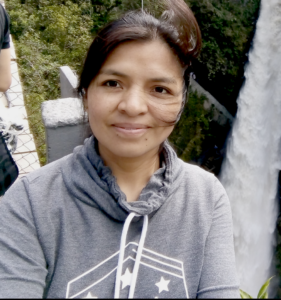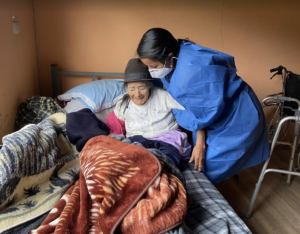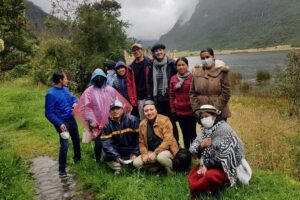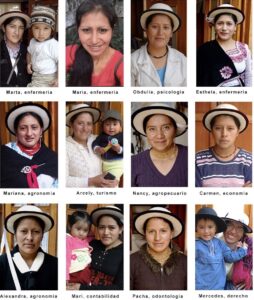Dear Friends: I’m very happy to be back in touch. Michael and I made a short trip to Cañar in the spring, when we found the Covid lockdown in Ecuador still in effect and cases rising, though nothing like previous levels. Masks were required throughout the country and public transportation was back but varied according to infection levels. Vaccinations were just starting in Cañar for the elderly and are now available to everyone, including children. Otherwise, in Cañar, at least, daily life felt “regular” – a favorite expression said with dead-pan tonality. Twice-weekly markets had started up and the town streets were alive with traffic and shoppers.  Since then, according to a recent post from the World Bank, “after a vaccination campaign earlier this year, Ecuador went from being one of the countries hardest hit by the pandemic to becoming an example for the world. This success story would have been impossible without the massive turnout of the population.” (Note: World Bank provided most of the funds for vaccines.)
Since then, according to a recent post from the World Bank, “after a vaccination campaign earlier this year, Ecuador went from being one of the countries hardest hit by the pandemic to becoming an example for the world. This success story would have been impossible without the massive turnout of the population.” (Note: World Bank provided most of the funds for vaccines.)

Two posters for rural areas of Cañar. Text on the left: visits door-to-door to give vaccines to all persons from five years old. Second right indicates same information for local health clinic.
Last year I started this letter by saying that despite the pandemic our program was alive and well. I think this year I have to say that while still alive – we are limping. When the lockdown hit Ecuador in March 2020, our women were scattered across the country, some as far away as the northwest coast and in the Amazon, and they came home to face the challenge of continuing classes without Internet. Everyone had cell phones, however, and so at the outset the women “attended” classes and submitted their work on their mobiles. Imagine how hard that was! Our local committee quickly decided to continue paying full scholarships ($150-$160/month) to help families buy access to Internet and support additional children at home. Today, 18 months later, university classes are still virtual. One woman suspended her medical studies after struggling all year.
However, our 2021 numbers provide a positive overall picture: we have 25 graduates, four with master’s degrees, and one PhD student. Michael and I are headed to Ecuador on December 1 to begin the sixteenth year of our life in Cañar, so during the next six months I will send more up-to-date news of the scholarship program on this blog. Meanwhile, I’ve checked in with some of our graduates (mostly via Facebook) to see what they are up to. 
 Carmen Loja, (Economics, 2011), worked with several financial cooperatives before realizing her dream of building a community-based tourism program, Kinti Wasi, in her home community of Suscal. Along with her cousin and another partner, Carmen hosts groups such as this one of US-based Amigos de Las Americas: https://bit.ly/3BYzCNa) where “high school and gap-year students experience the Andean worldview in agroecology, gastronomy, architecture, ancestral medicine and spirituality.” And I see by the website that Kinti Wasi is an Amigos partner for 2022. Congratulations Carmen! (She also welcomes individuals and small groups if any of you are contemplating a trip to Ecuador.)
Carmen Loja, (Economics, 2011), worked with several financial cooperatives before realizing her dream of building a community-based tourism program, Kinti Wasi, in her home community of Suscal. Along with her cousin and another partner, Carmen hosts groups such as this one of US-based Amigos de Las Americas: https://bit.ly/3BYzCNa) where “high school and gap-year students experience the Andean worldview in agroecology, gastronomy, architecture, ancestral medicine and spirituality.” And I see by the website that Kinti Wasi is an Amigos partner for 2022. Congratulations Carmen! (She also welcomes individuals and small groups if any of you are contemplating a trip to Ecuador.) Margarita and Mercedes Guamán (with younger sister and brother), are both graduates of our program, and their subsequent careers reflect the employment situation in Ecuador. Margarita (l), now married with two children, works with the 911 call center in Cuenca, not what she was expecting when she graduated with a degree in natural resources in 2011. Her younger sister Mercedes (in cap & gown), also married with two children, graduated as a CPA in 2018 and has worked steadily as an accountant for local organizations. Without exception, our scholarship women choose careers aimed at jobs. Among our graduates we have several accountants, nurses and nutritionists, along with an MD, veterinarian, dentist, lab clinician, psychologist, agronomist, gastronomist, lawyer, business and communication specialists, but not one in the humanities. I’m sad about this, but the public university system in Ecuador is geared towards technology and science, and our scholarship women are geared towards professional jobs.
Margarita and Mercedes Guamán (with younger sister and brother), are both graduates of our program, and their subsequent careers reflect the employment situation in Ecuador. Margarita (l), now married with two children, works with the 911 call center in Cuenca, not what she was expecting when she graduated with a degree in natural resources in 2011. Her younger sister Mercedes (in cap & gown), also married with two children, graduated as a CPA in 2018 and has worked steadily as an accountant for local organizations. Without exception, our scholarship women choose careers aimed at jobs. Among our graduates we have several accountants, nurses and nutritionists, along with an MD, veterinarian, dentist, lab clinician, psychologist, agronomist, gastronomist, lawyer, business and communication specialists, but not one in the humanities. I’m sad about this, but the public university system in Ecuador is geared towards technology and science, and our scholarship women are geared towards professional jobs.
 Juana Chuma is the only one of our women pursuing a PhD (so far). As a graduate in veterinary medicine from University of Cuenca (2015), she received our master’s support of $3000, but beyond that she has won scholarships and awards at UNAM in Mexico, including a training trip to Chile and a semester at University of Georgia in the US (delayed due to Covid but on track for 2022.)
Juana Chuma is the only one of our women pursuing a PhD (so far). As a graduate in veterinary medicine from University of Cuenca (2015), she received our master’s support of $3000, but beyond that she has won scholarships and awards at UNAM in Mexico, including a training trip to Chile and a semester at University of Georgia in the US (delayed due to Covid but on track for 2022.)
The pandemic has meant good news for those already working in public health, as the Ecuadorian government has offered them full-time, permanent jobs in hospitals and community clinics. To be permanently nombrado in your workplace in Ecuador is something like tenure – you can stay for life. This is good for job security but not so good for new graduates trying to break into their respective fields. However, the world always needs doctors, nurses and nutritionists, especially those who are bilingual Quichua/Spanish as are all of these below.

 Physician Luisa Duchi works in a community health clinic serving rural areas where many elderly speak only Quichua. Married with two children, she is from the Cañari village of Sisidhuayco
Physician Luisa Duchi works in a community health clinic serving rural areas where many elderly speak only Quichua. Married with two children, she is from the Cañari village of Sisidhuayco
Mary Zhinin is a nurse in a provincial hospital in Ambato, in central Ecuador, where her husband also works. They have two children and are from the Cañari village of Quilloac.
 Nutritionist/dietician Mariana Acero works in our provincial hospital in the city of Azogues, an hour from Cañar, which allows her to live at home in Correucu with her mother, the famous curandera Mama Michi Chuma.
Nutritionist/dietician Mariana Acero works in our provincial hospital in the city of Azogues, an hour from Cañar, which allows her to live at home in Correucu with her mother, the famous curandera Mama Michi Chuma.
Here is what graduation looked like in 2021: after five years in a very tough civil engineering program at University of Cuenca, Paiwa Acero sat in front of a laptop screen in my office in full graduation regalia (rented the day before), with script in hand, four people in attendance, and a Zoom program full of glitches. But that night her proud mother, Maria Esthela, organized an elaborate fiesta to celebrate with friends and family. Congratulations Paiwa!

 Great thanks to the Circle of Giving in Bend, Oregon who for the past five years have supported women in a new two-year distance program called “Integrated Childhood Development” to train preschool teachers. It’s a government-created course to offer post-secondary education to those who can’t afford to attend university or have other barriers such as caring for young children or elderly parents.
Great thanks to the Circle of Giving in Bend, Oregon who for the past five years have supported women in a new two-year distance program called “Integrated Childhood Development” to train preschool teachers. It’s a government-created course to offer post-secondary education to those who can’t afford to attend university or have other barriers such as caring for young children or elderly parents. The “Circle” of eight women commit to a set amount each year to pay stipends to women who need assistance with childcare, transportation or meals, or to help the program outfit teaching laboratories at the facility. In May this year I was a surprise recipient of gratitude (to the Circle) when the program included me on a wonderful rainy “solidarity” day in the mountains, including a trout lunch
The “Circle” of eight women commit to a set amount each year to pay stipends to women who need assistance with childcare, transportation or meals, or to help the program outfit teaching laboratories at the facility. In May this year I was a surprise recipient of gratitude (to the Circle) when the program included me on a wonderful rainy “solidarity” day in the mountains, including a trout lunch
 The Cañari Women’s Education Foundation (CWEF) is managed in Cañar by a local board of program graduates + me and the treasurer). Under normal circumstances, we meet two or three times a year to look over applications, review each scholar’s progress and decide how many spaces can be filled. Before Covid we also had a yearly meeting of all scholars, past and present; something we hope to do again in 2022. We keep the current group at about twelve, making it easy to manage monthly payments and monitor progress. Charlotte Rubin, our treasurer in Portland, keeps track of contributions and handles the banking here. We have no administrative costs.
The Cañari Women’s Education Foundation (CWEF) is managed in Cañar by a local board of program graduates + me and the treasurer). Under normal circumstances, we meet two or three times a year to look over applications, review each scholar’s progress and decide how many spaces can be filled. Before Covid we also had a yearly meeting of all scholars, past and present; something we hope to do again in 2022. We keep the current group at about twelve, making it easy to manage monthly payments and monitor progress. Charlotte Rubin, our treasurer in Portland, keeps track of contributions and handles the banking here. We have no administrative costs.
CWEF is an official 501(c) 3 nonprofit, which means your contributions are tax deductible, and every dollar goes directly to the women. Please make your checks to CWEF and return in the enclosed envelope. We’ll send everyone thank you letters with IRS receipts. You can also donate through PayPal with this DONATE button at the end.
Please stay safe, stay in touch, and profound thanks for your continuing support. Judy B.






I like it!
I like it very much!